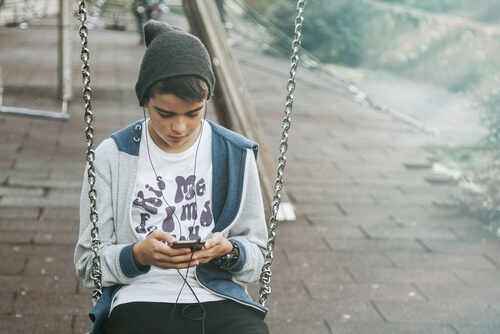8 Reasons why Children Under 12 Shouldn't Use Smartphones

It’s safe to say that children are starting to use smartphones at an earlier age than ever before, and more and more often. But there are some very good reasons why this isn’t good for them.
The biggest concern used to be that children spent too much time in front of the television. But now, children are so glued to their cell phones that they even fall asleep with them.
Some experts in the field say that cell phone use can be harmful to children’s health.
Today we’ll explain 8 reasons why children under 12 shouldn’t use smartphones.
Reasons why babies and children shouldn’t use smartphones
There are strong reasons why a child shouldn’t begin using technology before the age of 2. Although today’s children are practically born with electronic devices in their hands, it is very important to avoid any excess use and to know how it can affect them if their use is not regulated.
1. Brain development
When the brain is exposed to excessive use of technology, its growth can be accelerated, especially in babies between 0 and 2 years of age. This can lead to problems such as attention deficit disorder, cognitive delays, learning problems, increased impulsivity, and lack of self-control.

2. Excess radiation
The World Health Organization (WHO) classifies cell phones as a risk for children, and even for adults, because they emit too much radiation. Children are more sensitive to it, which increases their risk of cancer.
3. Mental illnesses
Several studies have revealed that the excessive use of new technologies is considerably increasing the rate of childhood depression and anxiety, attachment disorders, attention deficit disorder, bipolar disorder, psychosis, and other childhood behavior problems.
Smartphones are also linked to other factors such as social networks, where children are often prone to cyberbullying.
4. Aggressive behavior
With new technologies, children are more likely to see violent and aggressive content, which can alter their behavior.
We must remember that children imitate everything they see, which makes it even more dangerous to display any type of content without checking it first. Therefore, parents must be very attentive to what their children do.
5. Sleep alteration
Experts indicate that when parents don’t regulate their children’s use of technology in their bedroom, they have more difficulty falling asleep due to using their phones at night. This lack of sleep will greatly affect their academic performance and health.
6. Attention deficit disorder
The excessive use of technology can also cause attention deficit disorder in children, as well as diminish their interaction with other children or people.
It can also decrease children’s capacity for concentration and memory because the speed of content delivery affects these areas.
7. Childhood obesity
Frequent use of technology often involves a sedentary lifestyle, and this is a problem that is increasingly notable in homes. The lack of activity causes children to suffer from obesity, and this causes diseases such as diabetes or cardiovascular problems.
The constant overexposure of children to technology makes them vulnerable.
8. Childhood addiction
Some studies conclude that one out of every 11 children aged 8 to 18 are addicted to new technologies – a very alarming figure that may increase as years go by.
Each time children use an electronic device, they become more separated from their parents, family, and friends.

When can children and adolescents use smartphones?
The Japanese Association of Pediatrics began a campaign to ban smartphones for children, suggesting that parents exercise control and perform more recreational games with them.
The American Academy of Pediatrics and the Canadian Society of Pediatrics found that babies from 0 to 2 years should not use technology; while children from 3 to 5 years should use it in a measured way for only 1 hour a day. Finally, for those 6 to 18 years of age, technology should be used for no more than 2 hours a day.
We must be aware of the damage that new technology can cause to children and young people.
It’s difficult to avoid using these new devices because we’re practically born with them nowadays. But you can avoid having your child use them in excess, as this can cause great harm.
It’s important that technology doesn’t get in the way of spending time with family or reading a book.
It’s safe to say that children are starting to use smartphones at an earlier age than ever before, and more and more often. But there are some very good reasons why this isn’t good for them.
The biggest concern used to be that children spent too much time in front of the television. But now, children are so glued to their cell phones that they even fall asleep with them.
Some experts in the field say that cell phone use can be harmful to children’s health.
Today we’ll explain 8 reasons why children under 12 shouldn’t use smartphones.
Reasons why babies and children shouldn’t use smartphones
There are strong reasons why a child shouldn’t begin using technology before the age of 2. Although today’s children are practically born with electronic devices in their hands, it is very important to avoid any excess use and to know how it can affect them if their use is not regulated.
1. Brain development
When the brain is exposed to excessive use of technology, its growth can be accelerated, especially in babies between 0 and 2 years of age. This can lead to problems such as attention deficit disorder, cognitive delays, learning problems, increased impulsivity, and lack of self-control.

2. Excess radiation
The World Health Organization (WHO) classifies cell phones as a risk for children, and even for adults, because they emit too much radiation. Children are more sensitive to it, which increases their risk of cancer.
3. Mental illnesses
Several studies have revealed that the excessive use of new technologies is considerably increasing the rate of childhood depression and anxiety, attachment disorders, attention deficit disorder, bipolar disorder, psychosis, and other childhood behavior problems.
Smartphones are also linked to other factors such as social networks, where children are often prone to cyberbullying.
4. Aggressive behavior
With new technologies, children are more likely to see violent and aggressive content, which can alter their behavior.
We must remember that children imitate everything they see, which makes it even more dangerous to display any type of content without checking it first. Therefore, parents must be very attentive to what their children do.
5. Sleep alteration
Experts indicate that when parents don’t regulate their children’s use of technology in their bedroom, they have more difficulty falling asleep due to using their phones at night. This lack of sleep will greatly affect their academic performance and health.
6. Attention deficit disorder
The excessive use of technology can also cause attention deficit disorder in children, as well as diminish their interaction with other children or people.
It can also decrease children’s capacity for concentration and memory because the speed of content delivery affects these areas.
7. Childhood obesity
Frequent use of technology often involves a sedentary lifestyle, and this is a problem that is increasingly notable in homes. The lack of activity causes children to suffer from obesity, and this causes diseases such as diabetes or cardiovascular problems.
The constant overexposure of children to technology makes them vulnerable.
8. Childhood addiction
Some studies conclude that one out of every 11 children aged 8 to 18 are addicted to new technologies – a very alarming figure that may increase as years go by.
Each time children use an electronic device, they become more separated from their parents, family, and friends.

When can children and adolescents use smartphones?
The Japanese Association of Pediatrics began a campaign to ban smartphones for children, suggesting that parents exercise control and perform more recreational games with them.
The American Academy of Pediatrics and the Canadian Society of Pediatrics found that babies from 0 to 2 years should not use technology; while children from 3 to 5 years should use it in a measured way for only 1 hour a day. Finally, for those 6 to 18 years of age, technology should be used for no more than 2 hours a day.
We must be aware of the damage that new technology can cause to children and young people.
It’s difficult to avoid using these new devices because we’re practically born with them nowadays. But you can avoid having your child use them in excess, as this can cause great harm.
It’s important that technology doesn’t get in the way of spending time with family or reading a book.
All cited sources were thoroughly reviewed by our team to ensure their quality, reliability, currency, and validity. The bibliography of this article was considered reliable and of academic or scientific accuracy.
- Calpa, A. C. S., & Delgado, D. G. M. (2017). Influencia del Smartphone en los procesos de aprendizaje y enseñanza. Suma de Negocios, 8(17), 11-18. https://www.sciencedirect.com/science/article/pii/S2215910X17300010
- Bringué, X., & Sádaba-Chalezquer, C. (2010). Niños y adolescentes españoles ante las pantallas: rasgos configuradores de una generación interactiva. https://dadun.unav.edu/bitstream/10171/18443/1/n15-sadaba-chalezquer.pdf
- Pascual, I. R. (2006). Infancia y nuevas tecnologías: un análisis del discurso sobre la sociedad de la información y los niños. Política y sociedad, 43(1), 139-157. https://core.ac.uk/download/pdf/60659914.pdf
- Ruiz, R. D., & Castañeda, M. A. (2016). Relación entre uso de las nuevas tecnologías y sobrepeso infantil, como problema de salud pública. RqR Enfermería Comunitaria, 4(1), 46-51. https://dialnet.unirioja.es/descarga/articulo/5353331.pdf
- Río-Pérez, J., Sádaba-Chalezquer, C., & Bringué, X. (2010). Menores y redes¿ sociales?: de la amistad al cyberbullying. https://dadun.unav.edu/bitstream/10171/20588/1/articulo.pdf
This text is provided for informational purposes only and does not replace consultation with a professional. If in doubt, consult your specialist.








